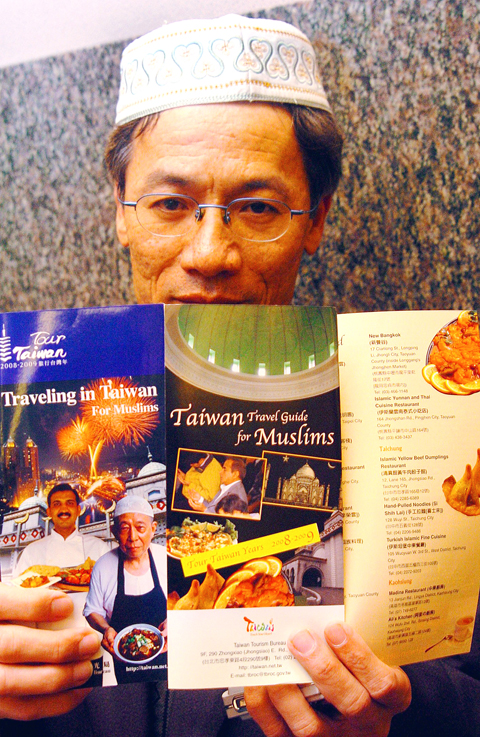The Tourism Bureau plans to launch a campaign to attract Muslim tourists with the target of luring 2,000 Muslims annually in the initial years, a newspaper reported yesterday.
The bureau held a seminar yesterday to introduce the untapped market of Muslim tourists to local travel agents and to discuss strategies that would help attract more Muslim tourists, the United Daily News said.
“There are millions of Muslims in the world who live in India, Malaysia, the Middle East and Arab countries. The potential is huge,” bureau official Liu Hsi-lin (劉喜臨) was quoted as saying.

PHOTO: CHANG CHIA-MING, TAIPEI TIMES
REPRESENTATIVES
He was joined by some 150 representatives from hotels, restaurants, recreational farms and the local Muslim community.
“Today’s seminar is just the start of a series of efforts that the Tourism Bureau will make to tap into the huge Muslim tourist market,” Liu said.
The report said Taiwan has designed three package-tour routes for Muslim tourists and will upgrade facilities at these tourist spots to meet the needs of Muslim visitors.
Taiwan has 60,000 native Muslims as well as 150,000 Muslim workers from Indonesia, Malaysia, Thailand and the Philippines. There are six mosques around the nation.
Attracting Muslim tourists is part of plans to boost inbound tourism, which has been hurt by the global economic downturn.
Last year, the nation saw 3.84 million foreign visitors, falling short of its goal of 4 million.
HALAL
In addition to inviting international Muslim clerics and experts to carry out on-site inspections and plan special itineraries for Muslim tourists, the Chinese Moslem Association in Taiwan is also planning to launch a Halal certification system so that every Muslim visitor can rest assured that they are eating foods consistent with their faith in Taiwan.
Food companies are also being encouraged to produce and export Halal food products to Muslim countries, the report said.

ANOTHER EMERGES: The CWA yesterday said this year’s fourth storm of the typhoon season had formed in the South China Sea, but was not expected to affect Taiwan Tropical Storm Gaemi has intensified slightly as it heads toward Taiwan, where it is expected to affect the country in the coming days, the Central Weather Administration (CWA) said yesterday. As of 8am yesterday, the 120km-radius storm was 800km southeast of Oluanpi (鵝鑾鼻), Taiwan’s southernmost tip, moving at 9kph northwest, the agency said. A sea warning for Gaemi could be issued tonight at the earliest, it said, adding that the storm is projected to be closest to Taiwan on Wednesday or Thursday. Gaemi’s potential effect on Taiwan remains unclear, as that would depend on its direction, radius and intensity, forecasters said. Former Weather Forecast

As COVID-19 cases in Japan have been increasing for 10 consecutive weeks, people should get vaccinated before visiting the nation, the Centers for Disease Control (CDC) said. The centers reported 773 hospitalizations and 124 deaths related to COVID-19 in Taiwan last week. CDC Epidemic Intelligence Center Director Guo Hung-wei (郭宏偉) on Tuesday said the number of weekly COVID-19 cases reported in Japan has been increasing since mid-May and surpassed 55,000 cases from July 8 to July 14. The average number of COVID-19 patients at Japan’s healthcare facilities that week was also 1.39 times that of the week before and KP.3 is the dominant

The Chinese Communist Party’s (CCP) working group for Taiwan-related policies is likely to be upgraded to a committee-level body, a report commissioned by the Mainland Affairs Council (MAC) said. As Chinese President Xi Jinping (習近平) is increasingly likely to upgrade the CCP’s Central Leading Group for Taiwan Affairs, Taiwanese authorities should prepare by researching Xi and the CCP, the report said. At the third plenary session of the 20th Central Committee of the CCP, which ended on Thursday last week, the party set a target of 2029 for the completion of some tasks, meaning that Xi is likely preparing to

US-CHINA TRADE DISPUTE: Despite Beijing’s offer of preferential treatment, the lure of China has dimmed as Taiwanese and international investors move out Japan and the US have become the favored destinations for Taiwanese graduates as China’s attraction has waned over the years, the Ministry of Labor said. According to the ministry’s latest income and employment advisory published this month, 3,215 Taiwanese university graduates from the class of 2020 went to Japan, surpassing for the first time the 2,881 graduates who went to China. A total of 2,300 graduates from the class of 2021 went to the US, compared with the 2,262 who went to China, the document showed. The trend continued for the class of 2023, of whom 1,460 went to Japan, 1,334 went to